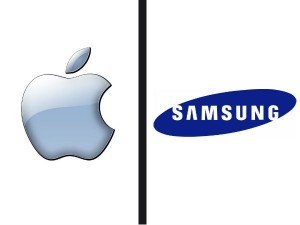SKorean court rules Samsung didn’t copy iPhone

However, in a split decision on patents, the panel also said Samsung violated Apple technology behind the bounce-back feature when scrolling on touch screens, and ordered both sides to pay limited damages.
The Seoul Central District Court ruling called for a partial ban on sales of products, including Apple’s iPads and smartphones from both companies, though the verdict did not affect any latest-generation smartphone.
The ruling affects only the South Korean market, and is part of a larger, epic struggle over patents and innovation unfolding in nine countries. The biggest stakes are in the U.S., where Apple is suing Samsung for $2.5 billion over allegations it has created illegal knockoffs of iPhones and iPads.
The Seoul ruling was a rare victory for Samsung in its arguments that Apple has infringed on its wireless technology patents, which previously have been shot down by courts in Europe.
“This is basically Samsung’s victory on its home territory,” said patent attorney Jeong Woo-sung. “Out of nine countries, Samsung got the ruling that it wanted for the first time in South Korea.”
The ruling ordered Apple to remove the iPhone 3GS, iPhone 4, iPad 1 and iPad 2 from store shelves in South Korea, ruling that the products infringed on two of Samsung’s five disputed patents, including those for telecommunications technology.
The court also denied Apple’s claim that Samsung had illegally copied its design, and that the shape and big display screen existed in products before the iPhone and iPad.
“Based on the similarity in these features, it is not possible to assert that the two designs are similar,” the court said in a ruling issued in Korean that was translated into English by The Associated Press.
But the court ruled that Suwon, South Korea-based Samsung had infringed on one of Apple’s patents on the feature that causes a screen to bounce back when a user scrolls to an end image. The court banned sales of Samsung products using the technology, including the Galaxy S2, in South Korea.
The verdict did not affect the iPhone 4S or the Galaxy S3 smartphones.
Court spokesman Kim Mun-sung said the court’s ruling was to take effect immediately, although companies often request that sanctions be suspended while they evaluate their legal options.
Nam Ki-yung, a spokesman for Samsung, said the company welcomed the ruling. “Today’s ruling also affirmed our position that one single company cannot monopolize generic design features,” he said.
Apple did not immediately respond to requests for comment.
The court also ordered each company to pay monetary compensation to its competitor. Samsung must pay Apple 25 million won ($22,000) while Apple must pay its rival 40 million won.
Courts in Europe have rejected similar claims by Samsung that Apple violated its wireless patents, with judges arguing that many of the patents are considered to be industry standards. Industry standard patents are a crucial technology for new players to make products compatible with the rest of the market and must be licensed under fair and reasonable terms.
Europe’s anti-trust regulator launched an investigation earlier this year into whether Samsung was failing to license its standard patents under fair and reasonable terms. In Friday’s ruling, the court found no fault with Samsung and ruled that it did not abuse its industry standard patents.
Apple filed suit against Samsung in San Diego, California, in April 2011, alleging that some of the South Korean company’s smartphones and computer tablets are illegal knockoffs of Apple’s iPhone and iPad. Samsung denies the allegations and argues that all companies in the cutthroat phone industry mimic each other’s successes without crossing the legal line.
Cupertino, California-based Apple is suing Samsung for $2.5 billion and demanding that the court pull its most popular smartphones and computer tablets from the U.S. market, making the case one of the biggest technology disputes in history.
Jury deliberations in San Diego began Wednesday after three weeks of testimony. The case went to the jury after last-minute talks between the companies’ chief executives failed to resolve the dispute.
Shortly after Apple filed its suit in the U.S., Samsung filed a complaint in South Korea against Apple for allegedly breaching its telecommunications patents.
The battle is all the more complex as Apple and Samsung are not only competitors in the fast-growing global market for smartphones and tablet computers, but also have a close business relationship.
Samsung, the world’s biggest manufacturer of memory chips and liquid crystal displays, supplies some of the key components that go into Apple products.